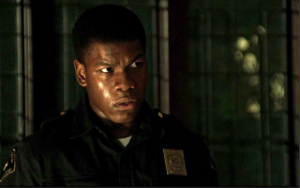DETROIT: 4 STARS. “an uncomfortable, gruelling watch.”
 There is a disclaimer at the end of “Detroit,” Kathryn Bigelow’s latest look back at our recent history. Before the final credits roll a title card reads something to the effect that the details of the bloody Algiers Motel Incident, the most infamous episode of the Detroit riots of the summer of 1967, were pieced together from available sources and eye witness accounts.
There is a disclaimer at the end of “Detroit,” Kathryn Bigelow’s latest look back at our recent history. Before the final credits roll a title card reads something to the effect that the details of the bloody Algiers Motel Incident, the most infamous episode of the Detroit riots of the summer of 1967, were pieced together from available sources and eye witness accounts.
It reminds us that what we have just seen is an interpretation of history and not a strict, unequivocal statement of fact. The title card may be a reaction to the backlash that followed Bigelow last film “Zero Dark Thirty.” She called that film, a look at the decade long hunt for Osama bin Laden, a “reported film,” suggesting it existed somewhere in the murky middle between drama and documentary. Despite her claim the film drew fire from critics (including the CIA) who felt it exaggerated the enhanced interrogation techniques allegedly used in the search for Bin Laden.
Her new film is every bit as provocative but whereas “Zero Dark Thirty” felt of its time, “Detroit,” despite its 1967 setting, feels ripped from the headlines. It uses historical fact and dramatization as an urgent plea for further study and conversation into the systemic racism that enabled Detroit police to murder three young African American men and why so little has changed in the intervening years.
The film begins with a police raid of an unlicensed nightclub filled with African American men and women enjoying a drink, some music and each other’s company. Manhandling men and women alike the raid attracts the attention of the entire neighbourhood. As club goers are forced into paddy wagons for the crime of congregating and having a drink, cries of “You can’t do that,” erupt into rage and the frustrated shouts change to “Burn it down.” A riot breaks out leading to looting, curfews and mass arrests.
The story splinters to introduce Philip Krauss (Will Poulter), a racist trigger-happy Detroit cop who justifies gunning down a man who stole a bag of groceries because, “They’re destroying the city.”
Nearby are Larry Cleveland Reed (Algee Smith) and Fred Temple (Jacob Latimore), a wannabe Motown singer and his best friend respectively. When Larry’s big debut at the Fox Theatre is scuttled because of the riot outside the theatre’s doors he Fred head to the Algiers, a nearby hotel, “until all this slows down.”
The laid back vibe at the Algiers seems a million miles away from the violence on the street, which by this point has seen 3200 people arrested and blocks of Detroit burned to the ground. Larry and Fred meet some girls (Hannah Murray and Kaitlyn Dever), listen to John Coltrane and feel safe until another resident, Carl Cooper (Jason Mitchell), shoots a starter’s pistol out the window. “We should teach those pigs a lesson,” he says. The police below, including Krauss, think a sniper is shooting at them and invade the building, guns drawn. By the time their “investigation” is done three young African-America men lay dead, shot at close range.
The lone uniformed voice of reason comes from Melvin Dismukes (John Boyega), a security guard in a grocery store down the street from the Algiers who tries his best to prevent bloodshed.
“Detroit” is an uncomfortable, gruelling watch. The physical intimidation, racially based violence, murders utilized against Reed, Temple and others as they plead innocence, is sickening. “I will kill you one by one until I find out what’s happening here,” says Krauss. Using psychological games and hard-core interrogation tactics he (and a handful of others) terrorizes his suspects and it is gut wrenching. Bigelow has a historical POV setting up the story and in the subsequent court case but her handling of the interrogation sequences is pure psychological horror. Claustrophobic and violent, it is as compelling as it is abhorrent.
Bigelow uses archival footage and stills to set the stage but it is a combo of her kinetic, muscular filmmaking and strong performances that make an impression. Boyega channels a young Denzel Washington, radiating decency while Poulter is a snarling ogre who revels in the powerlessness and dehumanization of his victims. As a paratrooper recently returned from Vietnam Anthony Mackie is a stoic presence amid the chaos.
Best of the bunch is Algee Smith as the young singer whose dreams are crushed when the Fox Theatre is evacuated just before his debut. While the dirty cops assert that “one bad minute shouldn’t define their lives,” it is through Smith’s performance that the long term effects of the Algiers event are the most tangible. The repercussions of that vicious, lawless night echo throughout his psyche, changing him forever.
The story in “Detroit” is fifty years old but the names of Dontre Hamilton, Eric Garner, John Crawford III, Michael Brown Jr., Ezell Ford, Dante Parker or any number of others who have been killed at the hands of the police in recent times, echo throughout.
